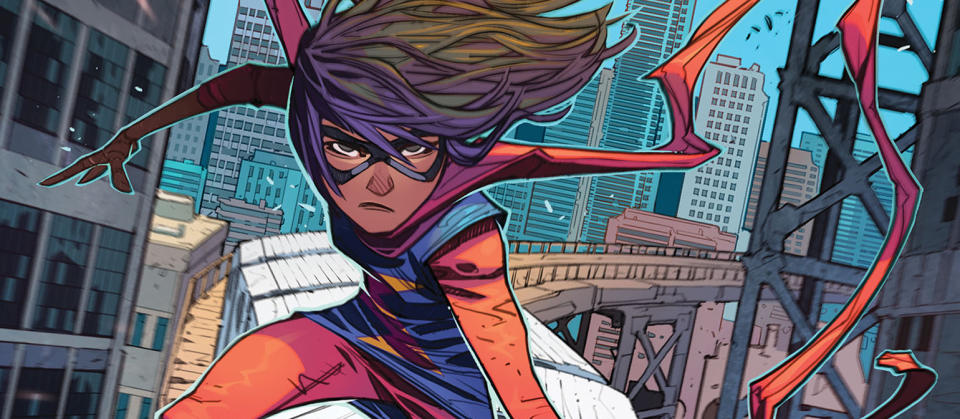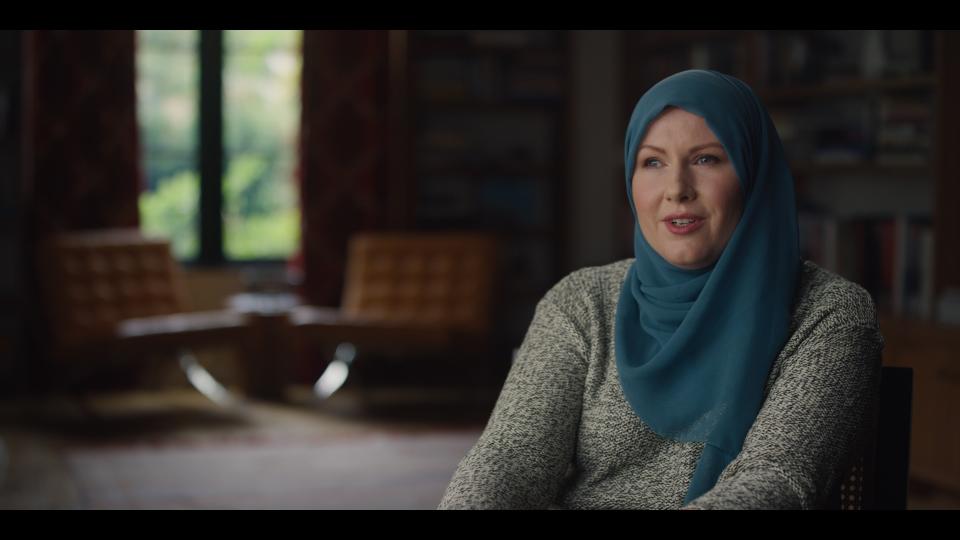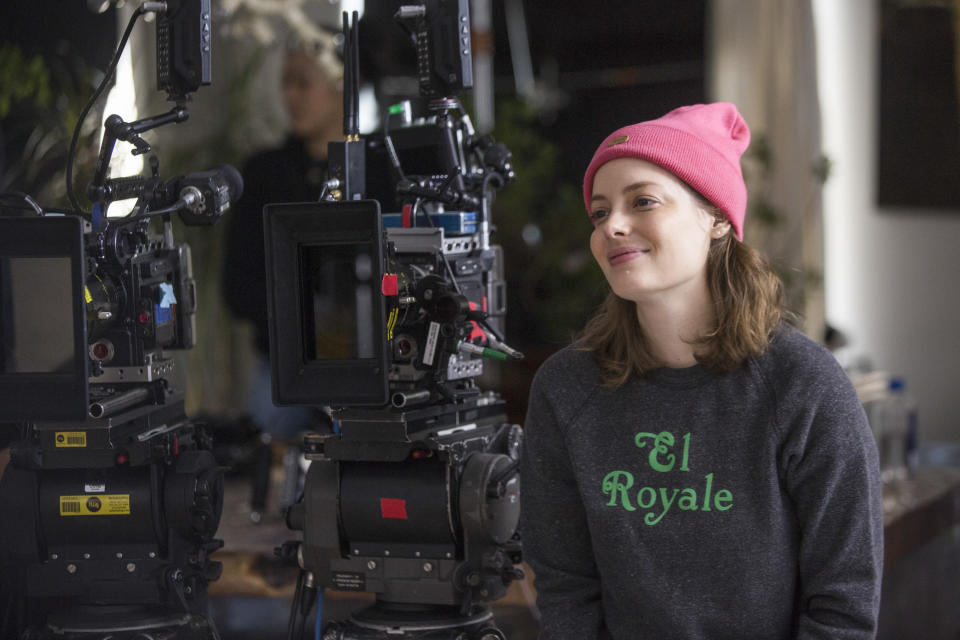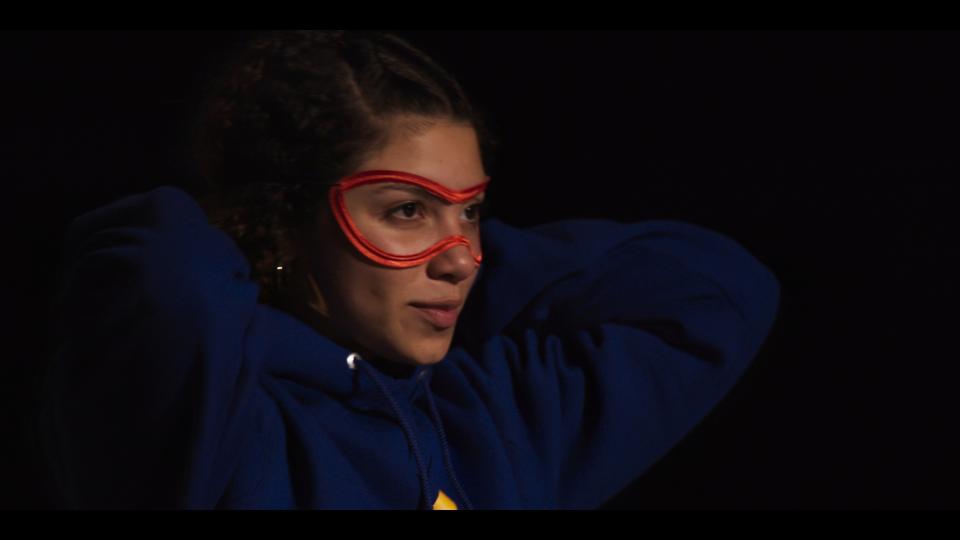Why Muslim superhero Kamala Khan represents the future of the Marvel Cinematic Universe
Watch: A sneak peek at Marvel’s 616 on Disney+
Marvel fans will always love Robert Downey Jr.’s Tony Stark 3000 for kicking off the Marvel Cinematic Universe in 2008’s Iron Man and then saving it a decade later in the Infinity Saga-capping Avengers: Endgame.
But the future of the MCU belongs to two Marvel-ous women: Captain Marvel and Ms. Marvel. Brie Larson already made her debut as the ultra-powerful Carol Danvers, whose 2019 blockbuster stands tall as the highest-grossing female-led superhero movie of all time… at least until the sequel drops in 2022.
Meanwhile, young Kamala Khan is poised to become a streaming sensation as Hollywood’s first Muslim superhero when the Ms. Marvel series debuts on Disney+ in the next few years with Iman Vellani in the title role.
Read more: Marvel’s Disney+ shows a primary focus for MCU
And the Jersey City-born heroine isn’t just an important fixture in the MCU of tomorrow: She’s front and centre across all of Marvel’s various platforms, including comic books, animated series and video games. Not bad for a character who has only been fighting crime for six short years, compared to her namesake’s five-decade career.

Kamala is also the glue that binds two key installments of the new Disney+ docuseries, Marvel’s 616 — a reference to the main Marvel Comics timeline. Premiering on Nov. 20, the eight-episode show offers inside-the-bullpen accounts of major and minor stories from the publisher’s rich history, including the infamous Japanese Spider-Man TV show, and the origins of the “Marvel Method” of comic-book storytelling.
The second installment, “Higher, Further, Faster,” explores some of the groundbreaking female characters and creators that have worked at Marvel over the decades, culminating in the creation of the latest Ms. Marvel in 2014 by Santa Amanat and G. Willow Wilson, both of whom are Muslim. And Episode 8, “Marvel Spotlight,” chronicles a high-school production of one-act plays that casts ordinary teens as Marvel heroes like Thor, Squirrel Girl and, of course, Kamala Khan.
The two documentaries share a connection beyond Kamala: They were directed by friends and former Community stars, Gillian Jacobs and Alison Brie respectively. “The character of Kamala Khan was very new to me,” Brie tells Yahoo Entertainment. “I didn't really have any knowledge of her before taking on this project. What was interesting for me was watching how the students connected to her vulnerabilities. The big message they took away from Kamala is caring less about what other people think of you and being your own champion.”

Jacobs interviewed both Amana and Wilson for “Higher, Further, Faster,” and her film illustrates how they built on a tradition that began decades before. “There was a period in the 1970s where Marvel tried to launch a bunch of female superheroes, and Carol Danvers’s Captain Marvel was the only one that really stuck,” she explains. (Created in 1968 as an ally of the original Captain Marvel aka Mar-Vell, Danvers first adopted the Ms. Marvel identity in the ‘70s, and finally became Captain Marvel herself in 2012.)
“But there's always been a hunger for those stories about exciting, relatable female characters in comics, and there’s also always been women who have wanted to work in the comics industry,” Jacobs continues. “So I think you can see how the synchronicity of writers, artists and characters that era led from Carol Danvers to Kamala Khan.” The two are specifically linked in current Marvel 616 continuity as well: Captain Marvel is Kamala’s favorite superhero, and when the teenager discovered she had powers of her own, she adopted the Ms. Marvel identity.

Kamala’s youth, as well as her unique identity, is key to why she’s emerged as one of Marvel’s heroes of tomorrow. “She’s incredibly important,” emphasises Marvel’s 616 executive producer Jason Sterman. “Look at how quickly she’s woven herself into the Marvel community at large. Gillian’s episode provides the backstory of where the inspiration came from and how it rolled out from there, and then Alison’s episode features an entire one-act play written about her being performed by kids in high school. Marvel itself has highlighted her in the Avengers video game, and the upcoming Ms. Marvel show on Disney+. All of these things just show the love for the character and where she can go.”
Of course, there’s an unfortunate history of female-led superhero movies and TV shows crashing and burning because of behind-the-scenes creative difficulties (see Halle Berry’s Catwoman or Jennifer Garner’s Elektra) or, worse still, toxic fanboys registering their discontent online (see Paul Feig’s mercilessly attacked Ghostbusters reboot). But having seen the way young people respond to Kamala Khan firsthand — not to mention the billions of dollars generated by Captain Marvel’s inaugural feature — Brie thinks that’s less of a danger that it used to be.
“Look at how many women came out of Captain Marvel going, ‘Oh my God, that was the movie I’ve been waiting for!’” Brie says. “With the right marketing, people can really get behind these films about women. I was very much inspired by all the students that showed their maturity by connecting with characters like Kamala, and going really deep with them. I don’t know that they were actively sitting around thinking, ‘I wish we could do Marvel plays,’ but when presented with that idea, their excitement level totally peaked, and it got more students involved in the theater program. The younger generation has given me hope across all the boards — here’s hoping they save the world!”

Just as in our world, not all of the MCU’s greatest heroes wear capes. The same year that Kamala Khan made her comic book debut, galactic guardians Groot and Rocket Raccoon burst off the big screen in Guardians of the Galaxy, James Gunn’s hugely successful space adventure based on a title that had previously resided on the margins of Marvel Comics. And those margins are precisely where actor and comedian Paul Scheer spends his time in the fourth Marvel’s 616 episode, “Lost and Found.”
The conceit of the film is that Scheer has been tasked by Disney+ executives to take a deep dive into the Marvel archives in the hopes of finding the next Guardians of the Galaxy-style breakout hit. And he eventually finds it in the form of Brute Force — a ‘90s-era comic about a group of animals who have been transformed into walking, talking and fighting super-soldiers through the magic of comic book science. The roll call of cybernetically-enhanced creatures includes a dolphin named Surfstreak; a big cat named Lionheart; a bald eagle named Soar; a bear named Wreckless; and, last but not least, a kangaroo named — what else? — Hip Hop.
Sound crazy? Sure… but as Scheer sagely notes, so did Rocket and Groot once upon a time. “We're in a world where two of the biggest A-list Marvel movie characters are a tree and a raccoon, right? You can't get any more insane than that! But Rocket’s story is also a beautiful story that’s about finding where you belong and who you are outside of the people who raised you. And I love that about him.”

So as he puts together his pitch for a new Brute Force revival, Scheer keeps his eye on loftier themes. “They’re wrestling with an evil that I think is important to be talking about: the climate crisis. And just like Rocket, these animals were being experimented on and they finally get a voice. And what is that voice? So it’s a show about opening our eyes and embracing the way that people want to be seen and recognized. I know this is very heading to talk about in regards to a bunch of animals that turn into soldiers! But that’s the way you need to embrace it.”
Interestingly, Marvel Comics has already taken steps towards bringing the Brute Force characters back into the fold of 616 continuity. Earlier this year, the one-shot issue Weapon Plus: World War IV tied their origin story directly into the origin of Marvel’s most popular mutant, Wolverine. Sarah Amos, Marvel’s 616 executive producer and VP of Development and Production at Marvel Entertainment, says that characters come and go from canon all the time. “We have over 8,000 characters, so there’s really a character for everyone. Sometimes, I’ll sit in on publishing retreats and hear a writer talk about a character they loved in their childhood and go, ‘I think I’m going to bring that guy in.’ So it really comes from a passion for the characters that our creators have, and the joy of bringing back a character and putting your own spin on it. Like, ‘Here’s a character we haven’t used in 30 years, and now they’re going to show up next month in Deadpool.’”

“Lost and Found” ends with Scheer pitching his own spin on a Brute Force reboot to Disney+, complete with a sizzle reel that includes the voices of Jon Hamm, Rachel Bloom and Nicole Byer as the various animal warriors. And while it likely won’t be premiering alongside Ms. Marvel, Scheer says that he’s already brainstorming the next obscure Marvel D-Lister he’s planning to promote to the A-List. “I have a lot of ideas for this comic, U.S. 1,” he says excitedly, referring to a long-forgotten ‘80s title about a long-haul trucker named Ulysses Solomon Archer who can pick up little-heard radio frequencies courtesy of an experimental alloy that’s been implanted in his head. “Kevin Feige, are you listening? Forget about Moon Knight — we’ve got something better for you.”
Marvel’s 616 is now streaming on Disney+.

 Yahoo Movies
Yahoo Movies 

